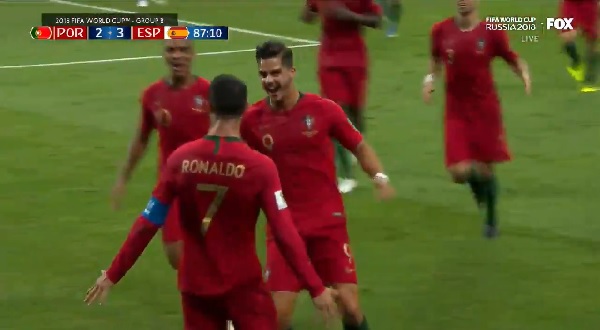10 takeaways from the first week of the FIFA World Cup

As of Tuesday, every team at the World Cup has played at least one game, meaning we can start to draw some early conclusions about how things are going. It has certainly been an unpredictable tournament, with the favorites struggling and some unlikely teams looking very good. Narratives about star players are already forming, and expectations are being adjusted accordingly.
So what have we learned from the first set of games? Here’s a list of ten items.
1) There is no clear favorite
If you were expecting to see someone really make an impression and show themselves as real contenders for the World Cup in the first round of games, you came away disappointed. Of the four clear favorites to win the World Cup, only France won their opening game, and they did so in very unconvincing fashion. Spain probably looked the best, held to a draw thanks to Cristiano Ronaldo, while Brazil struggled for end product against Switzerland and Germany was defeated by Mexico. There’s time for all of them to turn it around, but nobody set themselves apart at all.
2) Plenty of room for an underdog
A side effect of the favorites getting off to a slow start is that a lesser-heralded team could make a surprising run into the latter stages of the tournament. While Mexico was viewed as having a good shot at getting out of their group, for instance, their win over Germany could do that and more for them. Russia, too, has looked much better than expected in dominant wins over Saudi Arabia and Egypt. Japan and Senegal both won their opening game in a group that neither team was widely expected to get out of. If big teams are either knocking each other out or playing underwhelmingly, the door is open for someone to run through it.
3) VAR is a work in progress
Perhaps it’s somewhat surprising that the World Cup elected to utilize the Video Assistant Referee system, which isn’t even universally used at club level yet. Most prominently, the UEFA Champions League and English Premier League aren’t yet touching it. The concept of video review in soccer is still a very new one, and one that pretty much everyone involved is still figuring out how to navigate. England were particularly unimpressed, as what appeared to be a clear foul against Harry Kane that would have resulted in a penalty wasn’t even reviewed. As with a lot of sports that use video review, figuring out what is clear and convincing to overturn is also deeply subjective. VAR hasn’t been awful, but those who aren’t used to it probably aren’t thrilled with its implementation.
4) The Messi-Ronaldo debate will overshadow everything they do
Much like LeBron vs. MJ in basketball, Messi or Ronaldo remains the ongoing soccer debate that will almost certainly never be definitively settled one way or another. It extends to everything they do at the World Cup. While Ronaldo scored a remarkable hat trick against a leading opponent in Spain, Messi was held scoreless against Iceland and missed a penalty. Neither player has won a World Cup, though Ronaldo has a European championship to his name, and neither looks likely to win it this time around. That won’t stop the lack of international success from being used as a stick to beat Messi with, though.
5) South America and Africa have left a lot to be desired
Five African teams reached the group stages of the World Cup this year, but just one — Senegal — has won a game to this point. Egypt was a major disappointment, becoming the first team eliminated from knockout contention after losses to Uruguay and Russia. Little was expected of Tunisia, but Morocco and Nigeria’s performances won’t be remembered fondly either.
South America traditionally supplies a handful of contenders here, but this year, they’re off to a slow start as well. Only Uruguay won their opening match, with Brazil and Argentina drawing, while Peru and Colombia fell to surprising defeats. There’s plenty of time to turn it around, but that’s not the sort of mark the continent would have hoped for.
6) Late goals are the story
Many of the early games have been marked by late goals, which has really raised the excitement factor of the tournament. The first full day of the World Cup was marked by late winners from Iraq and Uruguay and a late Portugal equalizer. That trend has only kept up. England also won their first game with a stoppage time goal by Harry Kane. That’s three winners in the last five minutes, plus a dramatic equalizer, and though the pace has slowed since the first set of games, that’s a lot of late drama.
7) Health is a huge factor for some of the tournament’s biggest stars
Some of the players who were expected to set the tone in this tournament are clearly not at full health. Most prominently, Egypt’s Mohamed Salah missed his team’s first game with a shoulder injury and had little impact when he played against Russia, though he did win and score a penalty in a 3-1 loss. Brazilian star Neymar came in with injury questions and limped off after training Tuesday. James Rodriguez, who was the story of the 2014 World Cup for Colombia, was unable to start Tuesday’s game against Japan due to a lingering calf injury, though he did come on as a substitute. Beyond that, the World Cup happens after a long club season, and we have no idea how many players are nursing some variety of bumps and bruises.
8) The hack-a-star strategy is clear
Inevitably, some of the brightest stars will come to the World Cup and face off against lesser opposition. Oftentimes, that opposition resorts to ensuring that the star opponent can’t play their game by fouling them as frequently as possible. Take Neymar against Switzerland, for instance. The Brazilian icon was fouled ten times in the match, the most of any one player at a World Cup in two decades, but the Swiss would point to his lack of influence on the game and the fact that they got a 1-1 draw as evidence that their strategy was justified. Panama seemed to employ a similar strategy against Belgium’s Eden Hazard, though it didn’t work quite as well there.
What are small teams going to do to break up attacking play? They’re going to commit fouls. And sometimes, it’s going to work.
9) Teams are finding ways to exploit set pieces
In a tournament where the players don’t really play together for long periods of time and tactics are often basic and thrown together quickly, corners, penalties, and free kicks are often vital tools for picking up big goals. That has held true here. The first four days of the tournament saw three free kick goals, while several teams have had their entire output come from set pieces. Croatia used a corner and a penalty to beat Nigeria, while both of England’s goals in their win over Tunisia came from corner kicks. Those are inordinately high numbers, but an indication that teams are working hard on these aspects of their game and finding success.
10) Talent that doesn’t work well together is inferior to sturdy teams with a strategy
In other words, Argentina vs. Iceland. Sure, sometimes superior talent overwhelms — and if Messi had converted his penalty, we’d be saying that was the case in this game. But he didn’t, and so that becomes an example of a highly-touted favorite with some of the world’s best attackers being held to a draw by a team that is well-drilled, has a clear plan, and works together exceptionally well. Brazil’s 1-1 draw to Switzerland offered up a similar lesson, while Mexico’s win over Germany was a perfect example of one team having a better gameplan than their opponents despite being inferior on paper. Given the circumstances, it’s hard to put together a well-drilled unit at a World Cup, but those that do are often rewarded.







